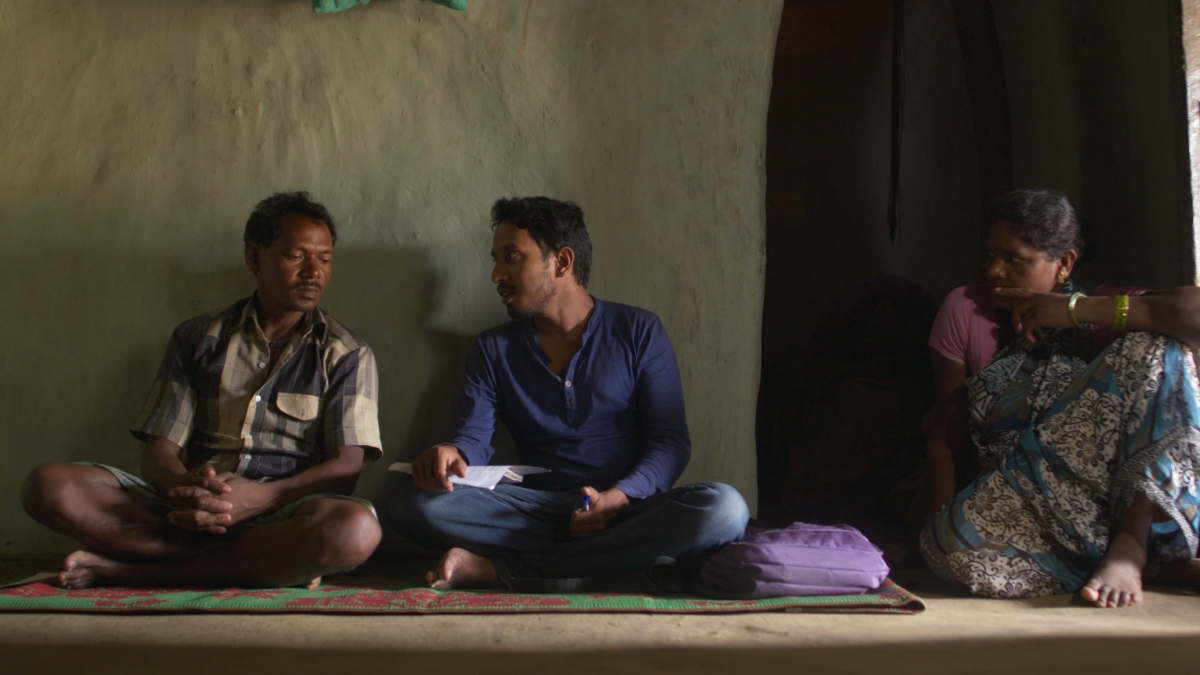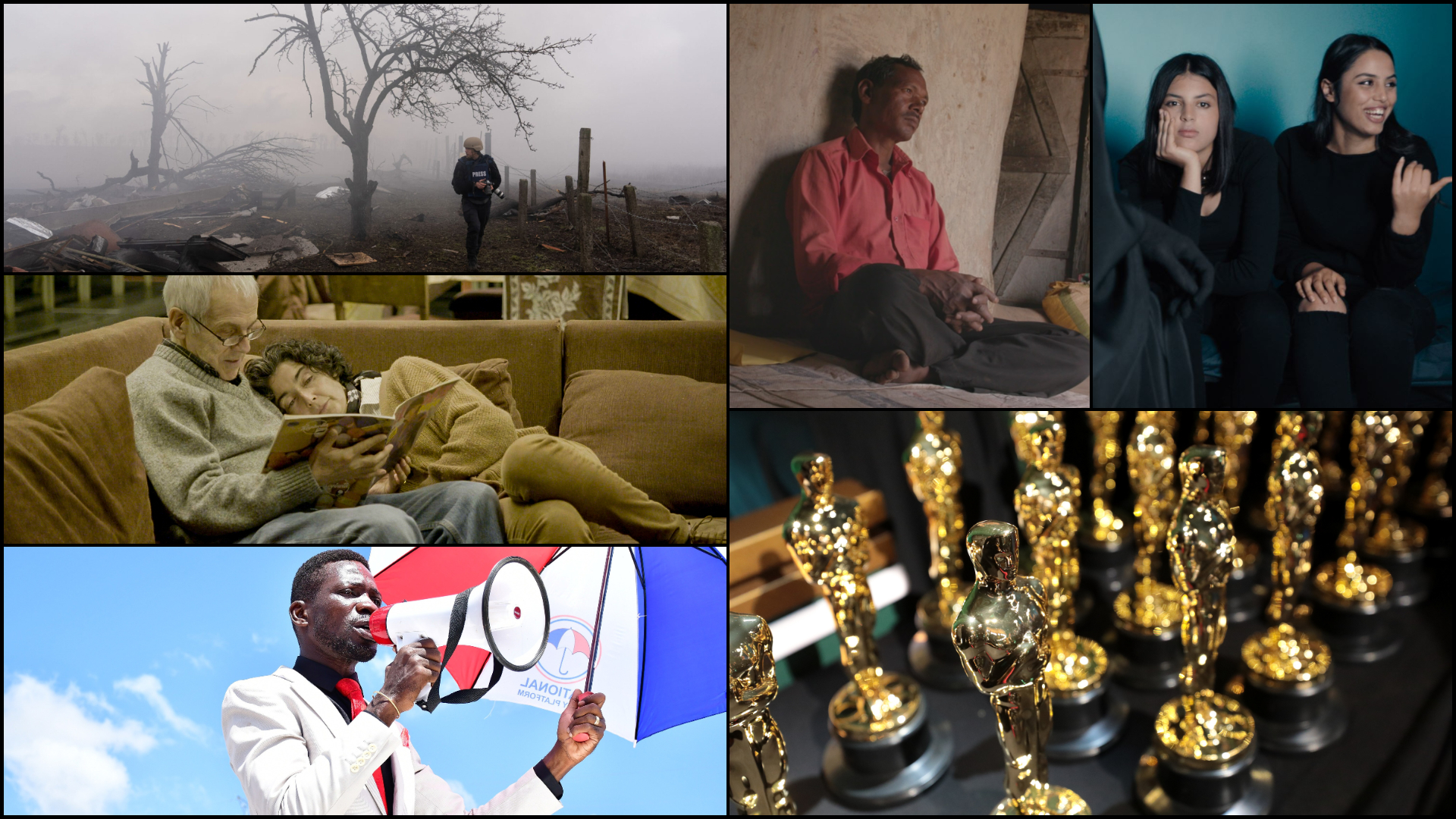Could the documentary side of the Academy Awards be a Canadian affair once again? After Daniel Roher scooped a win for Navalny last year, Canadians are back in the hunt. Halifax native Ben Proudfoot is a frontrunner in the shorts category, while Toronto’s trio of Nisha Pahuja, Cornelia Principe, and David Oppenheim are the dark horse of the features. Either way, these two films represent a very strong field of contenders from around the world.
It’s hard to fault the doc branch for any of its choice this year, despite the headlines that were generated after high-priced streamer docs driven by celebrities, like Still: A Michael J. Fox Movie and American Symphony, failed to land nominations. The moral of the story may simply be that Oscar pundits need to watch more documentaries. There were a lot of great documentaries made this year, not all about people with big reputations. With the two films that were expected to duke it out no longer in contention, audiences may be in for an exciting night on the documentary front!
Now that voting is officially closed, here are the films vying for Best Documentary Feature and Best Short Documentary this year, along with POV’s picks and Oscar predictions.
Oscar Predictions: Best Documentary Feature
Bobi Wine: The People’s President
All the whiny folks wringing their hands in the American trades over the absence of celebrity docs and deep-pocketed streamers can relax. (Also: read the room.) Bobi Wine: The People’s President might not feature a household name, but it’s the closest to a star vehicle in the fashion of Still and American Symphony with a major distributor behind it. The National Geographic doc, available on Disney+ alongside Marvel movies, features a charismatic character who’s a star in Uganda. The film directed by Brit Christopher Sharp and Ugandan Moses Bwayo follows musician Bobi Wine as he uses his voice and platform to make a bid for president. It offers everything that a fan of character-driven vérité docs could want: incredible access, a formidable hero, and political heft.
The film also challenges the bizarre complaints about the international nominees, which suggest that the five contenders are inside baseball. Bobi Wine, like the other nominees, isn’t a left-field contender. It comes to the Oscars with the Best Feature Documentary win from the International Documentary Association under its belt, along with the audience award from the CinemaEye Honors. Add to those gongs some nominations from the Directors Guild of America and the BAFTAs, and a respectable festival run that included slots at Venice, Telluride, and IDFA, and Bobi Wine brings clout from the circuit. It is, perhaps, the most conventional doc among the bunch—more of a feat of access than one of filmmaking—but the right place, right time appeal might be enough to sway the hearts of voters who chalked up a win for Navalny last year. (Watch it on Disney+.) – Pat Mullen
The Eternal Memory
When the US critics complain about the lack of celebrity bios, they immediately reveal their nationalist prejudices. In Chile, Augusto Góngora and Paulina Urrutia are iconic cultural figures who made a huge impact on their country’s reclamation of its status as a major bulwark for democracy. Many of us remember that the first horrifying September 11 took place in 1973, in Santiago, Chile, when the legally elected socialist government of Salvador Allende was overthrown by the right-wing military led by Augusto Pinochet. Many people died working against that fascist regime but among the courageous opponents who survived was Góngora, who became the editor of the leftist magazine Solidaridad and the host of the news program Teleanálisis during this fraught period. With a legitimate regime finally back in power in 1990, he became a beloved cultural journalist for Chile’s national broadcaster. In 1997, Góngora met and fell in love with the actor, director and trade union leader Paulina “Pauli” Urrutia, a partnership which was well-known and respected throughout the country.
Their relationship is the basis of The Eternal Memory, the intimate documentary by Maite Alberdi, which went on from winning the World Cinema Documentary Grand Jury Prize at Sundance to prizes from New York Film Critics (online), the Goyas and the Cinema Eye Honors. The film movingly depicts how Pauli, who was the Chilean Minister of Culture for four years, took on the caring of Augusto as he declined in health due to the onset of Alzheimer’s disease. We see the beauty of the love they shared even as the charming Augusto struggled to remember who he and Pauli were, and their affectionate, respectful marriage. Alberdi’s doc doesn’t ignore the terrors of Alzheimer’s—the emptiness that Augusto often felt as his life is drained from him. Nor does Alberdi ignore the tragic irony that Augusto Góngora, who fought for his country to remember Allende’s contribution to his country, loses his own memory towards the end of his life. Ultimately, The Eternal Memory is about the love that these two remarkable people shared and the legacy that they have produced.
Will it win the Oscar? Not in the USA. (Watch it on Hollywood Suite.) –MG
Four Daughters
Unfortunately, we don’t get the showdown between the two North African hybrid films about family secrets since Morocco’s The Mother of All Lies didn’t make the cut. Instead, the Tunisian-French Four Daughters, directed by Kaouther Ben Hania, marks a welcome citation for hybrid cinema in the documentary category. Four Daughters’ road to the Oscars marks the end of an incredible run that began with a rare non-fiction slot in the Official Competition at Cannes where it tied for the l’Œil d’Or documentary prize with The Mother of All Lies. It’s an exceptional work that rewards repeat viewings.
Ben Hania takes an innovative approach to exploring trauma, secrets, and lies as she tackles the story of Olfa and her four daughters. The novel ruse of the film sees two of the daughters played by actors and Olfa appearing alongside her two real daughters and her two “daughters,” except during moments when the story becomes too hard to bear. An actress steps in for her as well and the ensemble collectively confronts the absence that echoes throughout every frame of the film. It’s a bold work that finds truth in performance. Besides the Cannes prize, Four Daughters has accolades that include a Gotham Award and a joint win for Best Director at the CinemaEye Honors (shared with The Eternal Memory’s Maite Alberdi) and Best Documentary wins at the Independent Spirit Awards and France’s César Awards, among others. It would be unlikely for a film with such a tangible dramatic component to take the Oscar, though, as the Academy tends to have fairly conservative taste when it comes to documentary form. (In select theatres.) – PM
To Kill a Tiger
Name me a Canadian who isn’t rooting for Nisha Pahuja’s moving documentary to win the Oscar—there isn’t any. Though Pahuja’s To Kill a Tiger is set in India and charts a brilliant course unravelling the social and cultural constraints that unfold there, this documentary is very much a product of Canada, where it originated, was nurtured and produced at the oft-embattled National Film Board. The film, which deals with the consequences of a rape, is made with a depth of understanding and purpose that is remarkable. Not only do we explore the feelings of the subject of the attack, Kiran (a pseudonym), but we see the effects on her family, especially her father Ranjit, who defies convention and backs his daughter’s quest for justice. The film looks at an Indian society that still expects the woman to marry her attacker and offers the audience the rare opportunity to watch as a new path towards reconciliation is charted. To Kill a Tiger combines emotions and politics in a manner that is so successful that it has garnered awards around the world, from Sudbury to Palm Springs to Tel Aviv. It might win the Oscar; you can never tell. (Watch it for free at NFB.ca in Canada, coming soon to Netflix worldwide.) -MG
20 Days in Mariupol
This debut feature by Mstyslav Chernov is documentary at its finest. The film draws upon Chernov’s time as a videojournalist covering Vladimir Putin’s siege on Ukraine. He offers gripping and emotionally draining footage from Mariupol as villagers reel from the violence rained down on them and defend their country from invasion. Equally gripping is the sheer feat of getting the story told. Among the film’s most nerve-wracking moments is the seemingly mundane task in which Chernov tries to find a signal so that he can send his footage to his producer. While 20 Days in Mariupol serves an essential document of the war in Ukraine, it also excels as a portrait of the war entailed in getting a story out there from a war zone and the urgency of real time guerrilla action entailed in getting the story right ahead of the fake news machine.
These factors explain how Mariupol quietly emerged a frontrunner in what seemed like an open race. Chernov’s film won the Audience Award for World Cinema Documentary at the 2023 Sundance Film Festival, hit the ground running, and hasn’t stopped. Other support for the film’s frontrunner status include wins from the Directors Guild of America, the BAFTAs, the CinemaEye Honors where it scored Outstanding Nonfiction Feature and Outstanding Production, along with numerous wins from critics’ circles and a citation on the Oscar shortlist for Best International Feature as Ukraine’s submission. It’s only gained heat as the season’s progressed. While there’s a chance for other nominees to surprise, there’s also the sad reality that voters outside the doc branch probably had some catching up to do. Moreover, it’s hard to overlook the fact that Mstyslav Chernov’s portrait of the war in Ukraine serves as a vital example of film’s ability to show the world what happens when one nation uses its might to oppress another. (Watch it for free on YouTube.) – PM
Will Win
Marc says: I have two favourites: the extraordinary hybrid Four Daughters and our own To Kill a Tiger but it seems clear to me that 20 Days in Mariupol will get the Oscar for its courageous depiction of the on-going war in Ukraine. It’s rare to get the Academy’s attention away from US politics but the David v Goliath fight that the Ukrainians are fighting against Putin’s Russia has won hearts and minds across the country. Happily, 20 Days is a fine doc because it sure looks like the winner to me.
Pat says: I think 20 Days in Mariupol has a healthy lead on the competition. The urgency of the story, its emotional wallop, and artistic bravery make it a smart choice for Oscar voters. Four Daughters seems to be gaining popularity, but I just can’t see the Academy awarding a hybrid film that features such a strong element of performance.

Should Win
Marc says: Full disclosure: I’ve seen Pat’s reply and can only echo it!
Pat says: I’m all in for To Kill a Tiger. I’ve been a big fan since I first saw it in June 2022 and while I had big expectations for it—I figured it was a shoo-in for the Canadian prize at TIFF and the Canadian Screen Award—I am totally thrilled to see how far Nisha Pahuja and her team has taken it. It’s the little film that could. The film is an extraordinary work that gives a platform to courageous voices. And, in doing so, it finds a universal message in one family’s fight. Part of me admittedly is holding out hope that the dark horse could pull an upset. Tiger hasn’t necessarily hit as many high-profile spots as the other nominees have, but it’s emerged a winner everywhere it has played and amassed passionate champions. It’s a film you admire—but also one you root for.

Should Have Been There
Marc says: This has been a great year for documentaries! The five candidates are strong but there are others which are highly deserving. In a time when queer culture is finally being acknowledged, wouldn’t it have been great to have Paul B. Preciado’s Orlando: A Biography, a brilliant essay about literature, Virginia Woolf and trans-culture be nominated? In a totally different direction, how about having the Academy give a genuine Oscar—not just an Honorary one—to the brilliant Frederick Wiseman, who at the age of 94, has made another wonderful doc, Menus-Plaisirs—Les Troisgros, on the haute cuisine restaurant le Bois Sans Feuilles? Anyone who loves food and TV shows on the making of great recipes, will enjoy this woefully unacknowledged film.–MG
Pat says: I can’t really argue with any of these contenders. They’re a strong group of nominees and all are worthy. If pressed, I might switch Bobi Wine for another character piece from the shortlist: A Still Small Voice, which totally knocked me over with its portrait of an aspiring hospital chaplain offering spiritual guidance while seeking her own. And I would have loved to have seen Canada’s Oscar big Rojek in the mix alongside Tiger—wouldn’t that have been fun?
Oscar Predictions: The Short Docs
The ABCs of Book Banning: Legendary documentary producer/executive Sheila Nevins makes her directorial debut with this fun and fiery look at book banning in the USA. The film smartly invites young Americans to discuss the age-appropriate books they aren’t allowed to read. Plus, the 100-year-old widow whose testimony serves as the film’s centrepiece makes for a compelling highlight. (Watch on Paramount+.) – PM
The Barber of Little Rock: It’s rare to see a documentary that covers economics but that’s what this New Yorker commissioned film does exceedingly well. Arlo Washington is the quintessential “wealthy barber,” someone who has figured out how to make a lot of money, which, in his case, he has used for the greater social good. Banking while black is as bad as driving or nearly anything else when you’re part of a minority that the rich establishment instinctively opposes. This doc shows Washington’s project, the People’s Trust, at work, helping to make a difference by giving loans to budding Black entrepreneurs who want to make capitalism work in America despite being denied by the White establishment. This is a positive, genuinely engaging doc and a real candidate for an Oscar. (Watch for free on YouTube.) – MG
Island in Between: This study of the fraught relationship between Taiwan and mainland China from director S. Leo Chiang offers an effective personal tale. Stylistically, thematically, artistically, and emotionally, it’s quietly effective—but is it enough to score a win? (Watch for free on YouTube.) – PM
The Last Repair Shop: Music can change your life. This stylishly made doc focuses on extraordinary individuals, who dedicate their time to repairing musical instruments, making them useable again. Canadian director Ben Proudfoot, already an Oscar-winner for Queen of Basketball, is back with another moving doc, this time in collaboration with Black composer Kris Bowers, which shows how important a guitar or a piano can be to someone, whose capacity for growth may be hinged to having the right musical device at the right time. Proudfoot and Bowers spend their time with the selfless people who restore the soul of these wooden mechanisms, making them alive and effective again. This is an intimate and purposeful doc—and a likely winner. (Watch for free on YouTube or on Disney+.) – MG
Nǎi Nai and Wài Pó: Director Sean Wang offers a lively and affectionate portrait of his maternal and paternal grandmothers, who became like sisters when their husbands passed away. There’s a lot to admire in this portrait of staying sharp and embracing life, although it’s hard to overlook that Wang really just filmed his family clowning around, albeit delivering the most elevated version of a film we’ve seen before. Wang might not win this year but he’s surely a talent to watch. (Watch on Disney+.) – PM
Will Win
Marc says: Looks like another award for Proudfoot though Barber could be a surprise winner.
Pat says: The Last Repair Shop. While Ben Proudfoot won this award two years ago for The Queen of Basketball, his co-nominee Kris Bowers has yet to win despite extraordinary work in the documentary branch and music branch alike. And let’s be real: it’s one of the best short documentaries I’ve ever seen. It’s deeply moving, and the most accessible work of the bunch—an impeccably crafted doc that taps the viewer right in the heart while making a genuinely intelligent point about the ways in which the arts transform people’s lives. I think The ABCs of Book Banning is the wild card, though, given that it boasts Nevins’ first personal nomination after being the one of the biggest players in documentary…ever. She’s ushered several docs to the Oscars as executive producer and I think she’d win if this were to be strictly a doc branch vote. Like Repair Shop, ABCs also has a timely hook that’s hard to deny, but I think Repair Shop has the edge.
Should Win
Marc says: Shorts, whether in documentary or live action or animation are always interesting because they aren’t made with huge budgets or expectations. You’re more likely to see something genuinely pure in those categories and I must say that all the doc shorts are, at the least, sincere and well intentioned. Having said that, The Last Repair Shop is the clear and well-deserving winner.
Pat says: The Last Repair Shop. Every now and then, a category lands such a runaway contender that it seems like a no-brainer, if I were to be a brutally honest Oscar voter.














